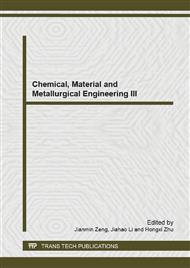p.390
p.394
p.400
p.405
p.410
p.414
p.419
p.423
p.426
A Trial on the Overexpression of Epidermal Growth Factor Receptor and Proliferating Cell Nuclear Antigen in NSCLC of Similar Differentiation
Abstract:
Objective: To explore the expression of EGFR and PCNA in lung squamous cell carcinomas and lung adenocarcinomas, and the relationships between their overexpression and cancer tissue typing or lymphatic metastasis. Method: Detect the expression of EGFR and PCNA in 44 cases of similarly differentiated cancer tissue and 16 cases of normal lung tissue by immunohistochemistry. Result: The expression of EGFR and PCNA in lung cancer tissue was significantly higher than that in normal lung tissue. Meanwhile, no significant difference existed between expression of PCNA and EGFR in lung squamous carcinomas and that in lung adenocarcinomas (P>0.05), nor between lymph node metastatic tissue and negative lymph node metastatic tissue (P>0.05). Conclusion: EGFR and PCNA were involved in the onset and development of lung cancer, and had some correlation with lung cancer. No significant correlations were observed between EGFR or PCNA overexpression and lymph node metastasis.
Info:
Periodical:
Pages:
410-413
Citation:
Online since:
January 2014
Authors:
Price:
Сopyright:
© 2014 Trans Tech Publications Ltd. All Rights Reserved
Share:
Citation:


